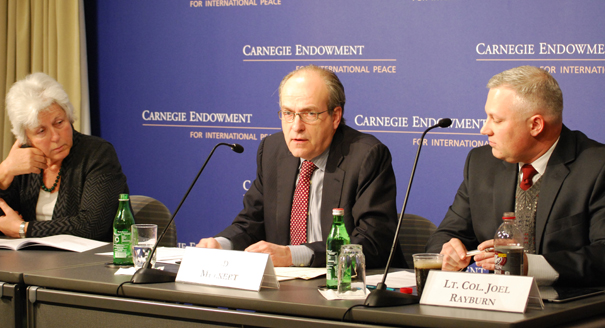Registration
Thank you!
You will receive an email confirming your registration.
IMGXYZ3519IMGZYXIraq faces a new crisis as the government of national unity comes under severe strain and sectarian tensions increase. Ad Melkert, former UN Special Representative in Iraq and Carnegie’s Marina Ottaway discussed the state of Iraq and prospects for the country’s future. Lieutenant Colonel Joel Rayburn of the National Defense University moderated the conversation and shared his reflections.
Iraq’s Current State and Future
- Decline of Interest: Many international actors seem to be losing interest in the Iraqi state of affairs, Melkert said. He warned that this was a mistake; failing to keep up with developments in Iraq would not serve the interest of any entity, including the United States.
- Internal and Regional Changes: Melkert emphasized that in light of the changes which Iraq is currently undergoing, much remains to be determined.The trajectory of events is being influenced by a number of factors, he added, including three decades-worth of oppression followed by an extensive occupation, a regional paradigm shift, and domestic accommodation policies in the Gulf.
- Adherence to the Constitution: Melkert argued that despite some hiccups, like the withdrawal of the Iraqiya Alliance from the government and disputes over territories like Kirkuk, the constitution has been successful thus far in keeping all actors in check. He also contended that the post-2003 generation of politicians and leaders are likely to maintain the status quo and not upset the country into instability, which would serve to harm their own positions. Ottaway, on the other hand, foresaw a problematic future in light of the fact that the constitution continues to be interpreted and re-interpreted as events take place.
- Cautious Pessimism and Optimism: While Ottaway labeled herself as cautiously pessimistic in light of heightened sectarian tensions and the continued re-interpretation of the constitution, Melkert stated that he is cautiously optimistic about the future of Iraq due to the relative success of the constitution thus far and the positive influence of the neighboring Arab Spring. Due to a history of administrative competence in Mesopotamia, an increasingly strong business community, and an interest among investors, a successful Iraq is probable, Melkert added. Rayburn said that he foresees positive political and economic developments in Iraq’s long-term, but that the next five to seven years would witness a painful transition.
Ethnic, Religious, and Political Pluralism
- Healthy vs. Unhealthy Pluralism: Ottaway suggested that although pluralism is necessary for democracy, there can be both healthy and unhealthy forms of pluralism. For example, she explained that identity-based political parties, largely defined by religion and ethnicity, often lead to a potentially dangerous polarization.
- Iraqi Nationalism: Although Iraq has historically experienced a period of widespread nationalism, Ottaway stated that it is unlikely that the country will witness another such period in the short-term. Nationalism often rises and succeeds in the face of a unified external threat, but currently, external influences are only contributing to heightened sectarianism in Iraq, she said. Melkert added that understanding the history of nationalism though would be helpful in comprehending the country’s dynamic with Iran and other neighbors.
- Pluralism in the Federal and Regional Government: Ottaway noted that the current struggle for power between federal and regional governments is healthy.
Maliki and the Malikioun
- Historic Leaders: Ottaway noted that Iraq has been burdened with historic leaders who have played political roles for an extensive period of time and who grow to believe that they have a right to be in the government. Such figures include Ahmed Chalabi and Iyad Allawi, she said.
- Maliki’s Consolidation of Power: Melkert stated that although Prime Minister Maliki is currently in a dominant position, he remains part of a coalition, to which he is often held accountable. Ottaway and Rayburn viewed Maliki as more problematically dominant.
- The Malikioun: Similar to the Saddamists or Sadamiyyoun who had helped to consolidate Saddam’s power, Rayburn suggested that there is now a rise of the Malikioun, officials who enable the consolidation of Maliki’s power while neutralizing the checks and balances of the constitution. This group is mostly composed of Maliki’s family, close friends, and advisers; they have no real ideology and seek only to strengthen Maliki’s power and undermine the power of his political opponents Iyad Allawi and Muqtada al-Sadr. Rayburn expressed a fear that this group’s actions would eventually push the nation into civil war.
Regional Influence
- The Neighboring Arab Spring: Melkert stated that the Arab Spring would likely have a positive effect on the developments in Iraq. The regional paradigm shift towards democracy would be beneficial. Rayburn disagreed with this outlook, pointing out that the Iraqi Security Forces had brutally suppressed an early protest movement in 2011. As a result, Rayburn said, there is no guarantee that the Iraqi public would have the ability to keep their government in check.
- Politics of the Region: Ottaway argued that regional politics would only serve to complicate matters further. Neighboring countries’ policies towards Iraq are colored by sectarian divisions; for example, the Gulf policies are pushing Iraq towards Iran, Ottaway stated.
- The Role of the United Nations: Melkert suggested that the United Nations would be important in the future of Iraq. He outlined some of the important roles the UN would play, including: helping to pick the members of the Electoral Commission for the upcoming Iraqi elections, monitoring human rights violations, providing technical assistance and advice, and helping to resolve tensions along the Iraq-Kuwait border.
